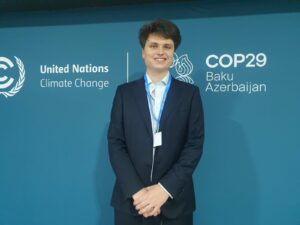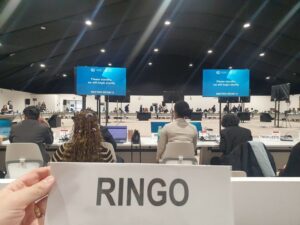By Theo Keeping
Last month, I attended the first week of COP29 in Baku, Azerbaijan. In format, it was much like other conferences I have been to, but more overwhelming in scale, as if a few international science conferences were stacked on top of each other, and then some world-leaders decided to visit. Worse, coffee was about £5 a cup if you were prepared to queue.

I have spoken to a lot of scientists about COP before and after and have come across a wide-range of views, but some of the most common are that it is a talking shop; that it is so tangled-up in process and bureaucracy that action is never taken; and that they despair at the prominence of oil-interests in attendance. In short, that the international response to climate change is woefully inadequate, and that they often see little merit in engaging with the process.
I can confirm that their concerns are justified. I spent my time there sitting in on the technical negotiations for climate finance, often in the role of the sole RINGO (Research and Independent NGOs) observer – with the responsibility of notetaking and reporting back on proceedings. Slow progress was made on the top-line question of money for developing countries in order to adapt to, and mitigate, climate change, with a controversial final decision to commit to developed countries providing $300 billion annually by 2035. This is, by pretty much every measure, insufficient to the scale of the task – and is little more than an inflation-adjusted continuation of the existing $100 billion commitment first proposed in 2009 at Copenhagen.

Scientists, however, should not despair, and should not disengage. COP is not the cutting-edge, it is the forum in which the slow grind of international consensus continues, it is the lowest common denominator of climate action and ambition that can currently be agreed, and a floor from which to build. This COP received much justifiably negative press in the liberal media, but incremental progress was made. Importantly, and beyond the main headlines, agreements were reached to increase transparency and assess environmental integrity in relation to climate impacts and decarbonisation investment. This is a crucial role for impartial scientists, and from a LEMONTREE perspective highlights the importance of our work on ecosystem scale carbon uptake, sequestration and disturbance by wildfire.
Theo Keeping is a PhD student at University of Reading working under the supervision of Professors Sandy Harrison and Ted Shepherd at the University of Reading and Professor Colin Prentice at Imperial University. Theo’s work focusses on developing a fine resolution probabilistic model of wildfire likelihood, behaviour and impact across landscapes, with the goal of developing a probabilistic fire hazard model that can be integrated into current Dynamic Global Vegetation Models.

